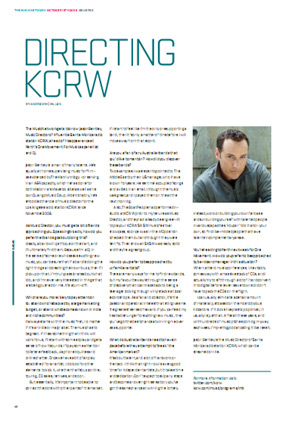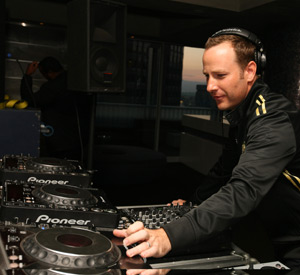[Note: this post originally appeared on OneMovementWord.com]
Ian James is the Managing Director of Mushroom Music Publishing and a guest speaker for the MUSEXPO Asia Pacific component of One Movement For Music (Oct 16-18). Andrew McMillen spoke with Ian about the nature of genius, indie labels, and fostering excellence.
Andrew: Ian, you’re involved with One Movement as a speaker, but I’m also curious about your goals when attending these kinds of conferences on behalf of Mushroom Publishing.
 Ian: It’s to impart information. It’s about sharing what I know with the next generation of managers as much as anything. I know that a lot of artists attend these events but I’d like to see an improvement in the infrastructure of our business, which primarily means having a lot better level of training or information going to the next generation of managers.
Ian: It’s to impart information. It’s about sharing what I know with the next generation of managers as much as anything. I know that a lot of artists attend these events but I’d like to see an improvement in the infrastructure of our business, which primarily means having a lot better level of training or information going to the next generation of managers.
What do you hope to achieve when you speak at these events, aside from imparting knowledge?
I like to entertain people. If they don’t walk away enjoying it, it probably hasn’t been worthwhile.
I was reading a 2003 interview with you on the AIR website, and this quote stood out. “There are so many people in the music business looking for a very limited number of opportunities. If you’re not excellent at what you do, you won’t get anywhere.” As Managing Director, how do you go about fostering excellence in those involved with Mushroom?
The trick to the people that work for me is that you choose the right ones first. You choose people that have got something special, and then you give them as much room to move into as you can. I’ve got a great International Manager called Zoe White, who is about 26. She spent three years in London working at Beggar’s Banquet. She had her own little vinyl label called Passport over there, which you can check out. I was told by a friend of mine that she was back in Melbourne and she’s been a great International Manager.
Similarly my A&R Scout, Michael Kucyk, who was brought in by Linda Bosidis, my A&R Manager. You find young people who really know what they’re doing and then you give them room to operate and you also give them the collective wisdom of the building. The Mushroom building is full of a lot of people who know what they’re doing.
I can imagine. From that same interview, another quote of yours that stood out was where you sat on a board meeting once and said, “I’m not the least bit interested in competency. In fact, what I look for is genius, but I’ll settle for extreme talent.” Do you hold those same standards with your staff at Mushroom Publishing, to convince them to sign only the best acts?
Yeah, that was in relation to the training boards and the standards that other industries apply to the people that work in them. It works just fine for the clerical world, for instance. In our world, you don’t stand a chance unless you’ve got a level of genius, or something really special.
When it comes to the staff, there are different types of staff. We don’t want everyone to be a potential rock star marking time in a publishing company. I’m not interested in people like that. They can go and mark time somewhere else. It’s really about people who want to be in the music business, and have the aptitude to do that, and not necessarily in promotions.
The final quote I’d like to discuss from that interview which you said in reference to independent record labels: “There is this theory that with a label you’re building a copyright asset with which you will then cunningly turn into millions of dollars.” Do you have anything to add to that statement, six years on?
 The ability to convert it into millions has been seriously diminished in that the little labels are struggling and unfortunately we are not seeing too many of them rise up. Certainly, the current financial situation has got something to do with it, including the fact that people simply aren’t buying or paying for things the way they used to, and particularly the output of indie labels. I find the hypocrisy almost stunning that these people can profess to have their favorite bands and not feel the need to actually do anything towards supporting them. I’m looking forward to debating that with anyone who wishes to cross the line when I’m in Perth, and explain that particular piece of self-serving philosophy.
The ability to convert it into millions has been seriously diminished in that the little labels are struggling and unfortunately we are not seeing too many of them rise up. Certainly, the current financial situation has got something to do with it, including the fact that people simply aren’t buying or paying for things the way they used to, and particularly the output of indie labels. I find the hypocrisy almost stunning that these people can profess to have their favorite bands and not feel the need to actually do anything towards supporting them. I’m looking forward to debating that with anyone who wishes to cross the line when I’m in Perth, and explain that particular piece of self-serving philosophy.
I find that it’s interesting that quite a lot of the labels that were the emerging labels at the time have ended up with Universal; Steve Pavlovich [of Modular Records] in particular. They’ve adopted a half-way position where they’re taking advantage of the power of the major companies, who are prepared to give those types of labels a lot of latitude. I think it’s a pretty good marriage, actually. It seems to work.
The pure indie labels are really struggling, I think, Andrew. I think they’re really doing it hard, which I don’t like.
To take a step away from talking about business for a moment, what are some of the most enjoyable aspects of your role? I can imagine it must be wonderful to watch the artists that you have supported and championed and the ability to support themselves via your publishing deals.
Yeah, that’s fantastic. In terms of the warm glow, that’s the best, to see someone really make a living out of it and consistently make a living out of it, not just a living, but make great music out of it, have the satisfaction of putting out three great albums. We’ve spent a lot of time with Eskimo Joe and we find they’ve grown up. They were young guys in Perth when we first met them. Now they’re really occupying their space brilliantly. That’s very satisfying.
![Ian James [right] with Jesse Hughes of Eagles Of Death Metal Ian James [right] with Jesse Hughes of Eagles Of Death Metal](http://andrewmcmillen.com/wp-content/uploads/2009/09/ian_james_jesse.jpg) Also, the great shows. I’m a big fan of Eagles Of Death Metal, who are not everyone’s favorite band. I went to a show in London, the last night of the Raymond Revue Bar, which was a ’60s strip club in Soho with red velvet curtains. It was a ladies’ night only, except I managed to smuggle my way in because I’m a friend of Jesse Hughes [pictured right], the singer from the band and also their publisher.
Also, the great shows. I’m a big fan of Eagles Of Death Metal, who are not everyone’s favorite band. I went to a show in London, the last night of the Raymond Revue Bar, which was a ’60s strip club in Soho with red velvet curtains. It was a ladies’ night only, except I managed to smuggle my way in because I’m a friend of Jesse Hughes [pictured right], the singer from the band and also their publisher.
Seeing the Eagles of Death Metal with about 300 London girls and me.. it was that sort of night. That’s what it’s about. You could just imagine, Andrew. That’s the sort of stuff that’s also wonderful.
Conversely, what are some of the less enjoyable or stressful elements of your job?
I guess the whinge factor, with everyone wanting something for less. It’s a litany about exploitation and how important it is for the artist that they get it and how this person, who is not going to pay you any money, is going to provide it. “Opportunity” is a word I hear very often.
Put it this way; you can’t blame people for trying but when you hear the same story, it’s a bit like those beggars in the middle of the city who have been asking for money for about ten years. You go, “Enough, we know you’re down on your luck, but you’ve been down on your luck in this exact same spot for ten years. Leave it out.”
I find a lot of people like that come to us and kind of aggravate my licensing staff. When my licensing staff get aggravated, they come and aggravate me. I get it down the line. That always annoys me, the “Hi, I’m in marketing and I want it for nothing.”
Put it this way; we’re a bit bulletproof here at Mushroom. It’s a big organization. Not many people try and cross us. No one succeeds. It’s not like I’m particularly vulnerable to things really annoying me because we’ve got a way to deal with it.
Finally, Ian, what are the personal qualities are integral to achieving success in the music industry?
I think you’ve got to be lively. I think you’ve got to have a good mind and you’ve got to be lively. That applies to both musicians, and to people that work in the business.
Don’t miss Ian James when he appears as a guest speaker at the MUSEXPO Asia Pacific component of One Movement For Music Perth, October 16-18 2009.
The Chemist – The Wolves’ Howls Shatter The Old Glass Moon

 The Beggars Group music blog strategy filters down to indie labels like Sydney’s
The Beggars Group music blog strategy filters down to indie labels like Sydney’s  Beyond Remote Control, EMI Music have maintained
Beyond Remote Control, EMI Music have maintained  Australian indie label
Australian indie label  Here’s a story that appeared in
Here’s a story that appeared in  I think our role has been consistent in serving the community. We’re listener-supported, so it’s about delivering compelling radio and looking to grow that support base. I am hoping that the work we do in the music department and overall at the station can grow our audience, both to our terrestrial radio audience in Southern California, and online to a global listenership.
I think our role has been consistent in serving the community. We’re listener-supported, so it’s about delivering compelling radio and looking to grow that support base. I am hoping that the work we do in the music department and overall at the station can grow our audience, both to our terrestrial radio audience in Southern California, and online to a global listenership. Also,
Also,  When I attend music conferences, I inevitably come away with a massive stack of CDs, and I actually try to sift through a lot of it and convert it to digital before I even leave town so I don’t have to pack the CDs on the flight. The music is going to end up on a hard drive anyway, so it doesn’t matter whether that happens in the hotel room or in my office back home.
When I attend music conferences, I inevitably come away with a massive stack of CDs, and I actually try to sift through a lot of it and convert it to digital before I even leave town so I don’t have to pack the CDs on the flight. The music is going to end up on a hard drive anyway, so it doesn’t matter whether that happens in the hotel room or in my office back home. Hailed as Asia’s ‘Queen Of Pop’, 28-year old
Hailed as Asia’s ‘Queen Of Pop’, 28-year old  “It was our first industry showcase outside of Germany. We played The Viper Room in front of mostly business people, but since we made a lot of contacts in LA, we had about 50 or 60 fans in front of the stage as well. It’s always an amazing chance to play outside of Europe. We took a camera man from LA to film the whole trip, and we’re editing a 90-minute documentary about the whole trip.”
“It was our first industry showcase outside of Germany. We played The Viper Room in front of mostly business people, but since we made a lot of contacts in LA, we had about 50 or 60 fans in front of the stage as well. It’s always an amazing chance to play outside of Europe. We took a camera man from LA to film the whole trip, and we’re editing a 90-minute documentary about the whole trip.” Ian: It’s to impart information. It’s about sharing what I know with the next generation of managers as much as anything. I know that a lot of artists attend these events but I’d like to see an improvement in the infrastructure of our business, which primarily means having a lot better level of training or information going to the next generation of managers.
Ian: It’s to impart information. It’s about sharing what I know with the next generation of managers as much as anything. I know that a lot of artists attend these events but I’d like to see an improvement in the infrastructure of our business, which primarily means having a lot better level of training or information going to the next generation of managers. The ability to convert it into millions has been seriously diminished in that the little labels are struggling and unfortunately we are not seeing too many of them rise up. Certainly, the current financial situation has got something to do with it, including the fact that people simply aren’t buying or paying for things the way they used to, and particularly the output of indie labels. I find the hypocrisy almost stunning that these people can profess to have their favorite bands and not feel the need to actually do anything towards supporting them. I’m looking forward to debating that with anyone who wishes to cross the line when I’m in Perth, and explain that particular piece of self-serving philosophy.
The ability to convert it into millions has been seriously diminished in that the little labels are struggling and unfortunately we are not seeing too many of them rise up. Certainly, the current financial situation has got something to do with it, including the fact that people simply aren’t buying or paying for things the way they used to, and particularly the output of indie labels. I find the hypocrisy almost stunning that these people can profess to have their favorite bands and not feel the need to actually do anything towards supporting them. I’m looking forward to debating that with anyone who wishes to cross the line when I’m in Perth, and explain that particular piece of self-serving philosophy.![Ian James [right] with Jesse Hughes of Eagles Of Death Metal Ian James [right] with Jesse Hughes of Eagles Of Death Metal](http://andrewmcmillen.com/wp-content/uploads/2009/09/ian_james_jesse.jpg) Also, the great shows. I’m a big fan of
Also, the great shows. I’m a big fan of